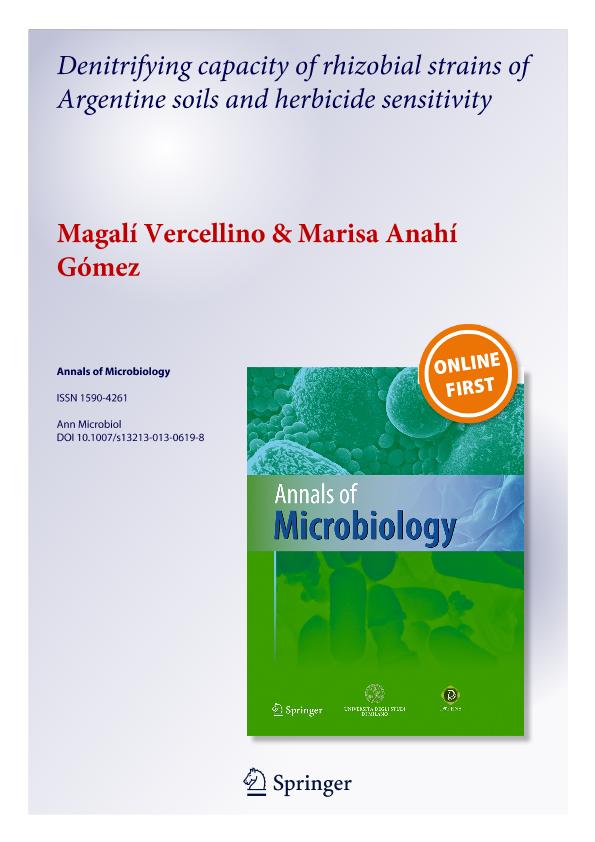Mostrar el registro sencillo del ítem
dc.contributor.author
Vercellino, Magalí

dc.contributor.author
Gomez, Marisa Anahi

dc.date.available
2019-07-10T18:52:16Z
dc.date.issued
2013-12-09
dc.identifier.citation
Vercellino, Magalí; Gomez, Marisa Anahi; Denitrifying capacity of rhizobial strains of Argentine soils and herbicide sensitivity; Università degli Studi di Milano; Annals Of Microbiology; 63; 4; 9-12-2013; 1563-1570
dc.identifier.issn
1590-4261
dc.identifier.uri
http://hdl.handle.net/11336/79313
dc.description.abstract
Agrochemical application in soils is a matter of environmental concern, and among soil microorganisms, rhizobia and their action before different pesticides are interesting to study, due to their taxonomic and functional diversity. The objectives of the present work were to assess the capacity of rhizobial populations to use herbicides as source of nutrients, as well as their ability to reduce nitrates and / or denitrify. Eighty-one strains belonging to four populations of different genera of rhizobia (Rhizobium, Mesorhizobium, Ensifer and Bradyrhizobium) were assessed. The effect of glyphosate, 2,4-dichlorophenoxyacetic acid, and atrazine on growth of the strains, as well as the ability of the strains to act on herbicide transformation to reduce nitrate and denitrify, were evaluated. The genera studied showed different responses to pesticides. Bradyrhizobium had the greater capacity to utilize the herbicides and among the compounds evaluated, atrazine was the most used as a source of energy. To conclude, some Bradyrhizobium strains were able both to denitrify and to use the atrazine herbicide. The results obtained in this study increase expectations of the use of rhizobia as inoculants, causing changes at the agricultural and environmental level and allowing an appropriate management of agricultural soil fertilization, efficiency in nitrogen fixation and a faster biodegradation of pesticides in soil.
dc.format
application/pdf
dc.language.iso
eng
dc.publisher
Università degli Studi di Milano
dc.rights
info:eu-repo/semantics/openAccess
dc.rights.uri
https://creativecommons.org/licenses/by-nc-sa/2.5/ar/
dc.subject
Denitrification
dc.subject
Herbicides Utilization
dc.subject
Rhizobial Populations
dc.subject
Soil
dc.subject.classification
Biología Celular, Microbiología

dc.subject.classification
Ciencias Biológicas

dc.subject.classification
CIENCIAS NATURALES Y EXACTAS

dc.title
Denitrifying capacity of rhizobial strains of Argentine soils and herbicide sensitivity
dc.type
info:eu-repo/semantics/article
dc.type
info:ar-repo/semantics/artículo
dc.type
info:eu-repo/semantics/publishedVersion
dc.date.updated
2019-06-10T14:22:24Z
dc.identifier.eissn
1869-2044
dc.journal.volume
63
dc.journal.number
4
dc.journal.pagination
1563-1570
dc.journal.pais
Italia

dc.journal.ciudad
Milán
dc.description.fil
Fil: Vercellino, Magalí. Consejo Nacional de Investigaciones Científicas y Técnicas. Centro Científico Tecnológico Conicet - Bahía Blanca. Centro de Recursos Naturales Renovables de la Zona Semiárida. Universidad Nacional del Sur. Centro de Recursos Naturales Renovables de la Zona Semiárida; Argentina
dc.description.fil
Fil: Gomez, Marisa Anahi. Consejo Nacional de Investigaciones Científicas y Técnicas. Centro Científico Tecnológico Conicet - Bahía Blanca. Centro de Recursos Naturales Renovables de la Zona Semiárida. Universidad Nacional del Sur. Centro de Recursos Naturales Renovables de la Zona Semiárida; Argentina
dc.journal.title
Annals Of Microbiology

dc.relation.alternativeid
info:eu-repo/semantics/altIdentifier/url/http://link.springer.com/article/10.1007%2Fs13213-013-0619-8
dc.relation.alternativeid
info:eu-repo/semantics/altIdentifier/doi/http://dx.doi.org/10.1007/s13213-013-0619-8
Archivos asociados
